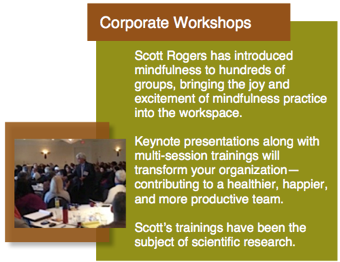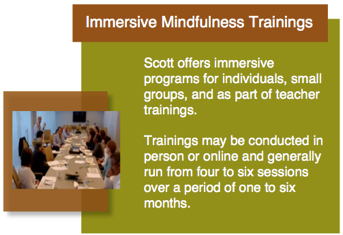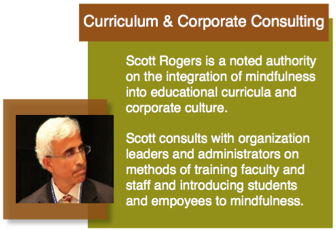Scott Rogers is a mindfulness teacher, trainer, researcher, and author. As an educator, Scott develops and integrates mindfulness programs into educational settings and course curricula. He is the author of four books and in February 2015 will be releasing “Mindfulness Now,” a book that offers a creative and seemingly novel way of establishing and maintaining a mindfulness practice.
Scott’s training in the area of mindfulness and its neuroscience underpinnings began in 1991 and includes:
Personal Practice: Workshops with Mindfulness-Based Stress Reduction (MBSR) founder, Jon Kabat-Zinn (2008, 2005), and Saki Santorelli (2005), and Mindfulness-Based Cognitive Therapy (MBCT) founder, Zindel Segal (2008); Retreat with MBCT founder John Teasdale (2008); training in Insight Dialogue and Vipassana Meditation with Insight Dialogue co-creator Gregory Kramer (2001), Sharon Salzburg (2005, 2007, 2012), and Jack Kornfield (2007); training in brain wave research exploring high performance brain states with Anna Wise (1999); and training in Transcendental Meditation with Marty Peters (1991).
Scott has devoted many years of personal practice to experiencing the intricacies, nuances, and mysteries inherent in mindfulness and other contemplative practices. For many years he co-led a mindfulness meditation group (Sangha) in Miami Beach. His most personal work has been with Fred Eppsteiner, a much admired mindfulness teacher, who was a student of Thich Nhat Hanh’s and Roshi Philip Kapleau’s, and guides the Florida Community of Mindfulness.
Scientific Interest: Scott explores the exciting work of neuroscientists, examining the relationship between mindfulness practices, changes in the brain’s structure and function, and its influence on behavior, thoughts and attitudes. In 2007, he conducted the CLE program, "Mindfulness, Balance & the Lawyer's Brain," perhaps the first treatment of mindfulness, the law and neuroscience recognized by a state bar for continuing legal education credit. In August 2008 he presented his work at an Interpersonal Neurobiology (IPNB) applications program in Los Angeles, led by Dan Siegel. In March 2009, Scott spoke on the “context-countered” approach to mindfulness, developed by Institute for Mindfulness Studies, at the 7th Annual International Scientific Conference for Clinicians, Researchers and Educators Investigating and Integrating Mindfulness in Medicine, Health Care and Society at U Mass Medical School.
In 2010, Scott began collaborating with cognitive neuroscientist, Amishi Jha, and together they are exploring the enduring brain and behavior changes that may accompany mindfulness training programs. Pursuant to this research, Scott has developed and conducted mindfulness trainings for high stress professionals, students, athletes that have been subjected to the rigors of the scientific method and have yielded significant results.
Scott's ongoing work as a student of mindfulness takes place through workshops, personal retreats, yoga, and, perhaps most profoundly, through his work sharing mindfulness with others.
Scott’s training in the area of mindfulness and its neuroscience underpinnings began in 1991 and includes:
Personal Practice: Workshops with Mindfulness-Based Stress Reduction (MBSR) founder, Jon Kabat-Zinn (2008, 2005), and Saki Santorelli (2005), and Mindfulness-Based Cognitive Therapy (MBCT) founder, Zindel Segal (2008); Retreat with MBCT founder John Teasdale (2008); training in Insight Dialogue and Vipassana Meditation with Insight Dialogue co-creator Gregory Kramer (2001), Sharon Salzburg (2005, 2007, 2012), and Jack Kornfield (2007); training in brain wave research exploring high performance brain states with Anna Wise (1999); and training in Transcendental Meditation with Marty Peters (1991).
Scott has devoted many years of personal practice to experiencing the intricacies, nuances, and mysteries inherent in mindfulness and other contemplative practices. For many years he co-led a mindfulness meditation group (Sangha) in Miami Beach. His most personal work has been with Fred Eppsteiner, a much admired mindfulness teacher, who was a student of Thich Nhat Hanh’s and Roshi Philip Kapleau’s, and guides the Florida Community of Mindfulness.
Scientific Interest: Scott explores the exciting work of neuroscientists, examining the relationship between mindfulness practices, changes in the brain’s structure and function, and its influence on behavior, thoughts and attitudes. In 2007, he conducted the CLE program, "Mindfulness, Balance & the Lawyer's Brain," perhaps the first treatment of mindfulness, the law and neuroscience recognized by a state bar for continuing legal education credit. In August 2008 he presented his work at an Interpersonal Neurobiology (IPNB) applications program in Los Angeles, led by Dan Siegel. In March 2009, Scott spoke on the “context-countered” approach to mindfulness, developed by Institute for Mindfulness Studies, at the 7th Annual International Scientific Conference for Clinicians, Researchers and Educators Investigating and Integrating Mindfulness in Medicine, Health Care and Society at U Mass Medical School.
In 2010, Scott began collaborating with cognitive neuroscientist, Amishi Jha, and together they are exploring the enduring brain and behavior changes that may accompany mindfulness training programs. Pursuant to this research, Scott has developed and conducted mindfulness trainings for high stress professionals, students, athletes that have been subjected to the rigors of the scientific method and have yielded significant results.
Scott's ongoing work as a student of mindfulness takes place through workshops, personal retreats, yoga, and, perhaps most profoundly, through his work sharing mindfulness with others.



